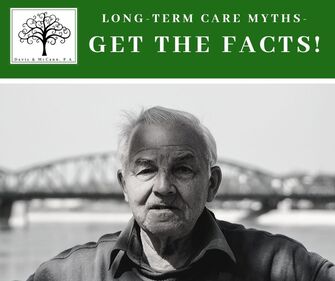 Rumors, gossip and hearsay are your worst enemy when it comes to long-term care planning. Many people delay planning because they hear one thing or another from a family member or friend, but they never take the time to investigate whether the information is accurate or if it even applies to their own situation. Before you assume you won’t qualify for Medicaid benefits for nursing home care, or wouldn’t benefit from long-term care planning, do yourself a favor and visit an experienced elder law attorney to get the FACTS. In the meantime, here are a few common long-term care misunderstandings held by many clients: 1. To qualify for Medicaid benefits, I must get rid of all my assets. False. In Kansas, although you’re not allowed more than $2,000 in “countable assets” to receive Medicaid, not all of your assets are counted toward computing your eligibility. For example, in Kansas, your house is an exempt asset so long as your spouse resides there or there is a chance that you will return home. Other exemptions include assets that can’t be converted to cash, burial plots, business or income-producing property, household furnishings, personal property, pre-paid funeral plans and a vehicle. Further, if you are married, your spouse (a/k/a well-spouse or non-applicant) may keep a portion of your countable assets as his/her “community spouse resource allowance”. However, something everyone should keep in mind, is that many of the aforementioned assets lose their exempt status after death. 2. Only old people with lots of money will benefit from a Medicaid Asset Protection Trust (MAPT). False. While it’s true that senior citizens with lots of money can benefit by creating a MAPT, individuals with a modest income also can enjoy the protections offered by a MAPT. The common denominator of clients who use a MAPT as part of their estate plan is the desire to protect specific assets from being sold out of the family due to skyrocketing long-term costs. Inherited, generational property and residences are two of the most common assets that clients identify as wanting to preserve for their heirs. 3. A person can revise and make changes to his/her MAPT at any time. False. A MAPT is an irrevocable trust, meaning that it cannot be changed by the grantor (the person who set up the trust) once signed. Assets owned in a MAPT are no long controlled by the grantor. Instead, an appointed trustee is fully responsible for the trust assets. 4. If my loved one is already in a nursing home, long-term care planning wouldn’t be beneficial. False. There are still things that can be done to preserve as many assets as possible for your loved one. This may be especially true if the nursing home resident has a well spouse still residing at home. 5. You can give away up to $15,000 a year and still qualify for Medicaid benefits. False. Any gifting done in the 60 months (5 years) prior to applying for Medicaid benefits, will cause an individual to be ineligible for a period of time. This myth could be due to a confusion between gift tax rules and Medicaid rules. You can gift up to $15,000 a year under current Federal tax laws (called the annual exclusion amount) and not incur a gift tax penalty. However, under Medicaid rules, ANY AND ALL gifts you have made in the five years preceding a Medicaid application will be scrutinized and likely result in a penalty period (a period of time where the individual is ineligible for Medicaid benefits). Gifts made prior to the 60 month look-back period are outside of the review period for Medicaid when considering your eligibility for benefits. For more information on long-term care and Medicaid planning, contact Davis & McCann, P. A., Dodge City, KS. We are members of Wealth Counsel, a national consortium of Estate Planning Attorneys and the National Academy of Elder Law Attorneys (NAELA). We focus our practice on providing clients with the best legal advice on Estate Planning, Medicaid and Long-term Care Planning, Family Business/Small Business Succession Planning, Probate, Trust Administration, Real Estate Transactions, 1031 Exchanges and related matters. Comments are closed.
|
NEWS YOU CAN USEDavis & McCann, P. A., Archives
April 2021
Categories
All
|

 RSS Feed
RSS Feed